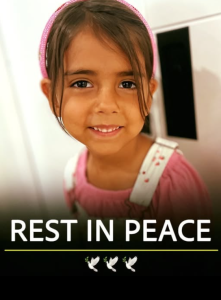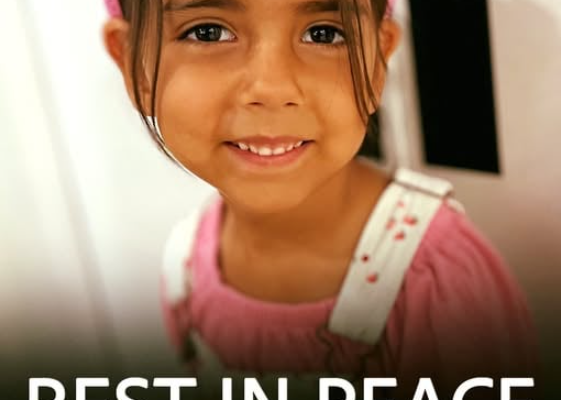Title: “The Storm Beneath the Street”
It was supposed to be a simple summer evening. The kind where children chase puddles and laughter echoes off the sidewalks. On Bahia Vista Street in Sarasota, Florida, the rain had come fast and heavy, drenching the neighborhood in a warm, chaotic downpour. But for five-year-old Zaria Miller, the storm would become something else entirely—a silent thief that would steal her from the world in a matter of seconds.
Zaria had been playing outside with her brothers, their joy uncontained, their games innocent. Nearby, her grandmother watched, trusting the familiar street, the familiar culvert, the familiar rhythm of childhood. But beneath the surface, a water main had broken, unleashing a surge that turned the storm drain into a deadly current.
At 6:30 p.m., the world changed.
The water, once playful, became violent. Zaria was swept into the culvert, pulled by a force no child could resist. Her grandmother’s screams pierced the rain-soaked air. “She got sucked into the culvert,” she cried into the phone, her voice breaking as she begged the 911 dispatcher for help. “God, why did we let her swim in there?”
The call was gut-wrenching. Children screamed in the background. A passerby joined the chorus of panic. Emergency crews raced to the scene, lifting storm grates, diving into the floodwaters. Zaria had been carried nearly 100 yards through the drainage system before she was found in a wooded retention area across from Sarasota Christian Academy.
She was still alive.
CPR was administered. She was rushed to Sarasota Memorial Hospital, then transferred to Johns Hopkins All Children’s Hospital in St. Petersburg. For four days, her family held vigil, praying for a miracle. But on August 28, Zaria passed away.
“It is with a broken heart I have to share that Zaria has received the ultimate healing, and is in the arms of Jesus,” wrote Kyle Weaver, a close family friend who organized a GoFundMe campaign. Nearly $100,000 was raised to help the Millers with medical bills, funeral costs, and the unbearable weight of loss.
But no amount of money could rewrite the story.
Zaria was described as bright, joyful, full of life. Her smile lit up rooms. Her laughter was the kind that made strangers smile. She was the kind of child who danced without music, who asked questions that made adults pause, who hugged with her whole heart.
And now, she was gone.
The community mourned. Neighbors left flowers near the culvert. Teachers from Sarasota Christian Academy held a moment of silence. Parents held their children tighter. The city, shaken by the randomness of the tragedy, began to ask questions: How could this happen? Could it have been prevented?
Storm drains are part of the invisible architecture of our lives. We walk past them daily, never thinking of the power they hold. But when infrastructure fails—when rain meets rupture—they become something else. Something dangerous. Something final.
Zaria’s death was not just a freak accident. It was a reminder of how fragile safety can be. How quickly joy can turn to grief. How the ordinary can become catastrophic.
Her grandmother’s voice still echoes in the minds of those who heard the 911 call. The guilt. The disbelief. The desperate wish to turn back time. “We were letting the kids play,” she sobbed. “And she got sucked underneath into the culvert”.
But this story is not just about tragedy. It’s about love.
The love of a family who rallied around their daughter. The love of a community that refused to let her name be forgotten. The love of strangers who donated, prayed, and wept for a child they never met.
It’s also about the quiet heroism of first responders—the firefighters who dove into floodwaters, the paramedics who fought to keep her alive, the nurses who held her hand in the hospital. Their efforts were valiant, their grief real.
And it’s about the resilience of those left behind.
Zaria’s brothers, too young to understand the permanence of death, now carry a silence where laughter once lived. Her parents, shattered but dignified, now walk a path no parent should ever have to tread. Her grandmother, haunted by that moment, now speaks of Zaria with reverence and sorrow.
In time, the city may install new safety measures. The culvert may be redesigned. The storm drain may be reinforced. But the scar remains.
Because Zaria Miller was not just a statistic. She was a daughter, a sister, a granddaughter, a friend. She was five years old. And she mattered.
Her story will live on—not just in headlines, but in hearts. In the way parents watch their children near water. In the way cities rethink their infrastructure. In the way communities come together in the face of unspeakable loss.
And maybe, just maybe, in the way we remember that every moment is precious.
So tonight, as the rain falls again somewhere, let it be gentle. Let it be kind. Let it carry not sorrow, but memory. Let it whisper the name of a little girl who danced in puddles and laughed in the sun.
Zaria.


